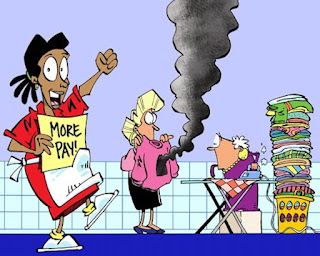Not Your Boy Scouts
Note: This is a follow-up to my story in Alfred Hitchcock, ‘The Precatory Pea’. After writing this article, I received terrible news, which I include at the end of this article.
A few matters in my Alfred Hitchcock story bear explanation. As so often happens with storytellers, several particulars, as my grandmother would say, coalesced at the right place and moment. Most significant was laconic Simon Parkin, formerly of Zimbabwe, née Rhodesia.
According to his wife, in-laws, children, and small animals, he’s an utter lamb. Nonetheless to strangers he, like my brother Glen, projects a don’t-ƒ-with-me aura. He’s NOT the guy you want to jostle in a bar, not twice, anyway. It’s not so much he suffers fools badly, he doesn’t suffer them at all. Perhaps that restrained intimidation may simmer from his military background.
He began to talk and eventually he turned to history. Simon told me about Selous Scouts, Rhodesia’s special forces, specialists at guerrilla warfare. I captured some of his words for my story: “Reid-Daly marshalled the finest counter¬insurgency team on the planet. Our fathers fought Soviets and Red Chinese, for God’s sake. Uncle Ron kicked Castro’s arse back to Havana.”
After speaking with a couple more people, I tracked down relevant material in a Pietermaritzburg bookstore. The mixed-race Scouts were fierce. They were sly. They were feared. Their ferociousness scared the hell out of the communist putative freedom fighters. But interestingly, they became known for an offer that couldn’t be refused.
Critical Career Path
Unfortunately, I couldn't justifiably include one of the Scouts’ most interesting philosophies, a sort of prisoner triage. When the Scouts took POWs, they looked for those who might be saved from prison or possible execution. They offered captives an opportunity to join the Scouts.
This wasn’t done haphazardly, but was well planned, testing each. For example, during interviews, the interrogator and a too-casual guard would leave the room occasionally and, during one of these exits, the guard ‘accidentally’ left his rifle behind in a corner. How the prisoner reacted determined his future… or lack thereof.
I wouldn’t have given that program good odds, but surprisingly captured recruits turned out to be especially loyal with a success rate of eight or nine out of every ten.
Clearing the Air
Wikipedia is experiencing one of its hysterias about Selous Scouts, arguing that violent apartheid-era Scouts who’ve written on the subject shouldn’t be allowed as sources. Let’s be clear– they weren’t angels. They were at-risk soldiers for the white government of Rhodesia. But their fierce reputation spread, leaving behind a sense of awe. Think Rommel. Think King Shaka.
I received cautions not to write about Selous Scouts and especially don’t criticize them. Simon didn’t think an outsider could write about them at all. But no, I didn't plan to criticize.
My mind raced in a different direction. Zimbabwean and South African mercenaries were highly sought after apartheid, but the Blackwater 2007 mass murder in Nisour Square, Baghdad temporarily reduced demand for hired guns.
What if, my thinking went, what if unemployed wannabes fancied themselves as heirs of Selous Scouts? And what if they turned to cross-border crime to fund themselves?
As our Nellie noted, her nemeses were urban bad guys, not soldiers of the bush. In a literal sense, they didn’t know their own land.
A Colourful Cast
Like real Scouts, each of my bad guys brings a different heritage to the party:
- Smith — Rhodesian English
- Buhle — Ndébélé
- Smuts — Afrikaner
- Svitsi — Shona
and the other characters:
- Nellie — Zulu
- Barbara — SA English
A spread of ethnicities like this appears fairly commonplace in South Africa.
 |
| Eve, Madam, and Mother |
Apartheid may have ended, but a vigorous service economy remains for workers who fall outside of BEE, Black Economic Empowerment. In South Africa, the domestic black/white relationship is close and complex with considerable interpersonal involvement that retains a certain formality.
A sly comic strip, Madam & Eve captures some of this attitude. Madam Anderson may be the employer, but she ain’t the boss. Four million readers follow them… Black, White, Brown, and Coloured– and yes, South Africa has those designations as Trevor Noah has explained. (Eve's niece Thandi is one of the most delightful characters ever.)
 |
| You are not reading this wrong. (World Cup ad) |
Nando’s, a famous chicken restaurant (its peri-peri hot sauce has been seen on the shelves of my local Walmart), is known for its sexy and politically incorrect hilarious ads about South Africa issues. You have to love people who laugh at themselves. Who else but Nando's would offer a WTF Special? (Wednesday, Thursday, Friday) One advert is sooooo risque, I don't dare provide a link, much as I'd love to.
[And I do love South Africa. Of all the countries I’ve visited, lived, and worked in, South Africa is my favorite. I loved it and I could easily live there.]
Military Hardware
The story references the ugly, stubby weapon ‘HMC’, sometimes called a spraygun. Here it means ‘hand (or handheld) machine carbine’ and not an M1 designated QUAL HMC made by Quality Hardware Manufacturing Company.
As opposition to apartheid took effect around the globe, South Africa and Rhodesia could no longer buy on the arms market. As a result, they began manufacturing their own designs, some considered the finest in the world. Their boat-hull shape and double skins made military vehicles notable for their resistance to mines and IEDs. You can see one example, the Casspir in the film, District 9. The Marauder came along later. It was featured in the British television programme Top Gear.
US flat-bottom HumVees faired poorly in Iraq. IEDs ripped through the floors of vehicles. Soldiers welded steel plates underneath, creating their own double hull, although a better solution was manufactured elsewhere.
Salad Days… it’s all in the wrist.
After our Nell stitches up the doctor, she makes her exquisite salad and serves each a bowl in the Nguni tradition. This distinctive method of serving looks like this: The server extends the bowl in one hand while cupping the forearm with the other hand.
I recommend salade lyonnaise without extra red berries.
Breaking News that may Break Your Heart
The following is disturbing and it reveals a major spoiler in the story. Proceed with caution.

















